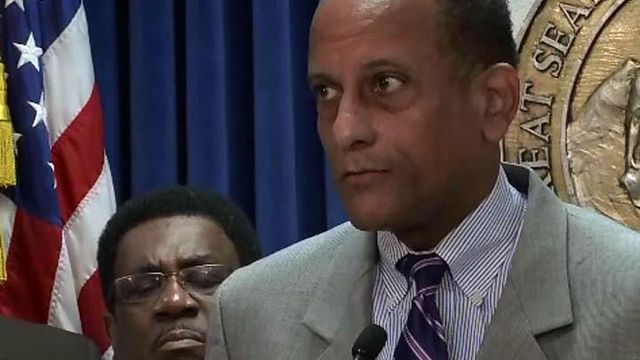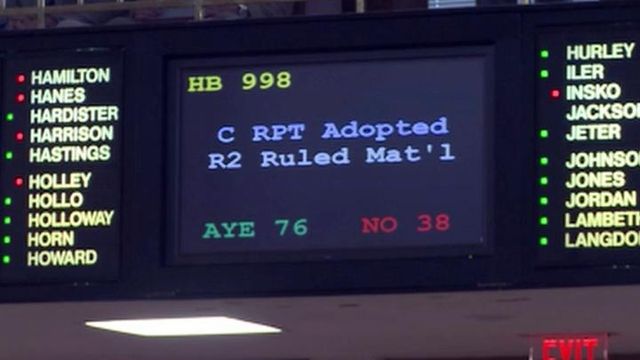Tax plan gets initial OK in legislature
The House and Senate gave tentative approval Tuesday to a tax reform plan that top lawmakers and Gov. Pat McCrory rolled out Monday.
The proposal sailed through both chambers, despite strong criticism from Democrats, and final votes are expected Wednesday. McCrory could sign the measure by the end of the week.
The package – the first major changes to North Carolina's tax structure in about 80 years – calls for reducing both personal and corporate income taxes. It also would eliminate the estate tax and preserve the ability of most nonprofits to get refunds of what they pay in sales taxes.
Republican lawmakers called the reform plan an important step in getting North Carolina's economy back on track. It would put money back into people's pockets to spend and would spur business growth and job creation, they said.
"This bill is the jobs bill of this session. In fact, it may be the jobs bill of an entire generation," said Rep. Nelson Dollar, R-Wake.
Democrats argued, however, that the proposal provides hefty tax cuts for wealthy people and companies at the expense of the middle-class. Sales tax increases on electricity usage, movie tickets and other entertainment and product warranties would wipe out any savings from a lower income tax for middle-class families, they said.
"This bill is helpful if you're a millionaire. It does not help you if you're in the middle class," said Rep. Paul Luebke, D-Durham. "This bill has been set up as a tax cut for the very wealthy."
According to an analysis by the legislature's nonpartisan staff, taxpayers at both ends of the income spectrum will pay less. For example, a married couple filing jointly with two children who make $40,000 a year will pay $80 less under this tax plan. The same couple filing jointly with two children who make $250,000 will pay $2,434 less.
Sen. Josh Stein, D-Wake, said 90 percent of the benefit of the legislation will go to the wealthiest 5 percent of state residents, so most retirees and small-business owners will see their overall tax burden increase.
Rep. Joe Sam Queen, D-Haywood, laughed at the notion that the tax reform plan was a jobs bill, saying he's been waiting all session for GOP lawmakers to uphold their promise to focus on job creation. He maintained that legislation that has already passed the General Assembly, such as cuts to unemployment benefits and a refusal to expand Medicaid, has cost jobs.
"It's a stretch to call this a jobs bill," Queen said. "What's missing is the needed revenue to support the institutions that have driven our economy."
The proposal would raise about $500 million less in revenue than the current system over the next two years. Over five years, revenue would drop by more than $2 billion.
The revenue question was a major sticking point between the House, Senate and McCrory in recent weeks. The governor insisted that any plan provide enough revenue for him to carry out his priorities.
"How many teachers are we going to fire to pay for this?" Stein asked about the lower revenue. "How much are we going to raise tuition at community colleges?"
Sen. Jerry Tillman, R-Randolph, said the only reason Democrats don't like the bill is because of cuts to government spending.
"If your mantra is, 'We need more money to run government,' you're not going to get it while we're here," Tillman said.
The plan replaces the three-tier personal income tax system with a flat tax of 5.8 percent in 2014, which drops to 5.75 percent in subsequent years. Standard deductions increase to $7,500 for single filers, $12,000 for heads of households and $15,000 for married couples.
The corporate tax rate would be cut from the current 6.9 percent to 5 percent by 2015. If North Carolina meets revenue targets in the coming years, officials said, the corporate rate will drop even further, to 4 percent in 2016 and 3 percent in 2017.
"The bottom line is the bottom line," said Sen. Andrew Brock, R-Davie. "It's all about money in the pockets of people in North Carolina."
The plan also includes the following provisions:
- Deductions for mortgage interest on first homes, something that had been a point of contention between the House and the Senate, will be capped at $20,000.
- Charitable contributions will remain fully deductible for itemizers.
- The child tax credit will continue and will increase for those making less than $40,000.
- Social Security income will remain exempt from state taxes.
- North Carolina's gas tax will be capped until June 30, 2015.
- Most nonprofits will be able to claim refunds of what they pay in state sales taxes. The compromise plan puts a cap of $45 million on the amount of refund claimed in any one year, which should allow all but the biggest nonprofit hospitals to reclaim all of the money they pay in sales taxes.
- The estate tax is repealed.
- A deduction on retirement income is eliminated.
- The state's franchise tax, a property tax on businesses, goes unchanged but will be studied for reform in future years.
- Starting in 2014, the sales tax holidays for back-to-school and Energy Star products are eliminated.
House Republicans cut off debate on the bill after about 25 minutes, which angered Democrats.
"The people of North Carolina have a memory. They can see that their voice is being denied," House Minority Leader Larry Hall said.
The Senate debate wasn't curtailed, but the result was the same.
Sen. Bob Rucho, R-Mecklenburg, who authored a more sweeping tax reform bill earlier in the session, called the compromise legislation "a good first step" that North Carolina needs to take to become more competitive for business and jobs.
"It's hard to change, but I think we all realize that what we have isn't working," Rucho said, promising more changes in the next few years.











